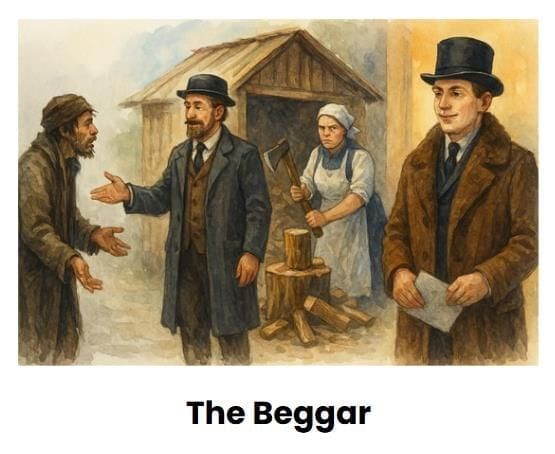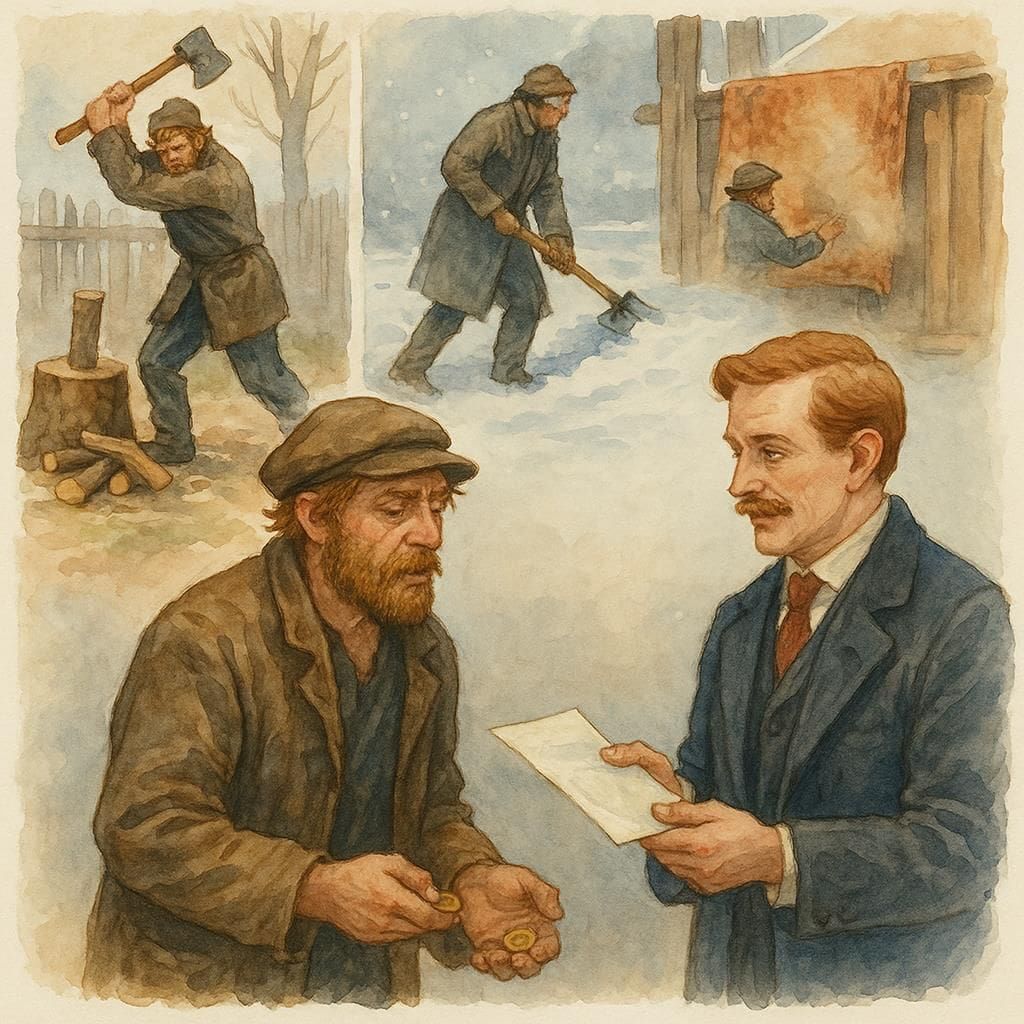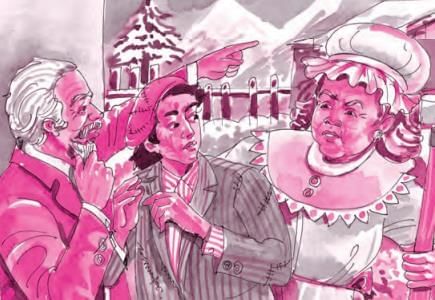Class 9 Moments Supplementary Reader Chapter 9 Question Answers - The Beggar

Q1. Describe the first meeting between Sergei and Lushkoff. How did Sergei take pity on Lushkoff?
Ans: One day, advocate Sergei met a beggar named Lushkoff, who was wearing tattered clothes. Lushkoff asked Sergei for help, claiming he had a job offer in Kaluga but lacked the money to get there. Sergei recognised Lushkoff from a previous encounter on Sadovya Street, where he had lied about being a student expelled for unpaid fees. When confronted, Lushkoff admitted he made a living by deceiving others and was actually unemployed, resorting to begging. Although Sergei refused to give him money, he offered Lushkoff work instead. He brought him to his home to chop wood, despite noticing that Lushkoff appeared physically weak and reluctant to work. Sergei's maid, Olga, supervised the task, and Sergei eventually paid Lushkoff for his efforts. This act of offering work instead of alms reflected Sergei's pity and his desire to assist Lushkoff in a more dignified manner.
Q2. Sergei brought Lushkoff home to get some wood chopped. How did Sergei help Lushkoff afterwards?
Ans: After Lushkoff chopped wood, Sergei felt a sense of satisfaction, believing he had helped reform a beggar. He invited Lushkoff to return on the first of every month to earn money by chopping wood. Despite being frail and struggling to stand, Lushkoff came regularly and took on various tasks, such as shovelling snow, organising the woodshed, and beating dust out of mattresses. For these jobs, he received small payments ranging from twenty to forty copecks. When Sergei moved to a new house, he hired Lushkoff to assist with packing and moving furniture. During this time, Lushkoff appeared more silent and sober. Sergei was impressed by his improvement and wrote a letter of recommendation for Lushkoff to a friend, which helped him secure a job as a copier. Sergei took pride in helping Lushkoff find a more stable occupation and improve his life.

Q3. Describe the last meeting between Sergei and Lushkoff. How did Olga help Lushkoff to be a real man?
Ans: Two years later, Sergei met Lushkoff at a theatre, where he noticed that Lushkoff was well-dressed, sporting a coat with a fur collar and a sealskin cap. Lushkoff shared that he was now a notary, earning thirty-five roubles a month. Sergei was thrilled to see Lushkoff standing on his own feet. During their conversation, Lushkoff revealed a surprising truth: it wasn’t Sergei who had helped him change his life, but Olga, Sergei’s maidservant. He confessed that he had never chopped any wood during his visits; it was always Olga who did the work for him. Her compassion and silent support motivated him to quit drinking and turn his life around. Olga’s kindness, patience, and selfless actions were crucial in Lushkoff’s transformation.
Q4. What values did Olga exhibit while saving the life of Lushkoff?
Ans: Olga, Sergei’s cook, exhibited remarkable compassion, kindness, and selflessness while aiding Lushkoff. Although she appeared harsh and often scolded him, she deeply sympathised with his struggles. Olga quietly took on the hard work that Lushkoff was too weak to do himself, demonstrating her concern for his well-being despite his dishonesty and alcohol addiction. She chopped wood for him, allowing him to earn some money and preserving his dignity. By doing this, Olga provided Lushkoff with a vital second chance at life. Her actions highlighted the transformative power of kindness and selfless service, which ultimately led to Lushkoff's reformation and success.
Q5. Sergei’s sympathy was as important as Olga’s noble deeds that reformed Lushkoff. Discuss.
Ans: While Lushkoff credited Olga for his transformation, Sergei’s sympathy and intervention were equally vital. Instead of turning Lushkoff over to the authorities or dismissing him as a liar, Sergei chose to offer him work. This decision provided Lushkoff with a dignified way to earn money, marking a crucial first step towards his rehabilitation. Sergei’s genuine concern for Lushkoff led him to assign small jobs and eventually recommend him for better employment. Without Sergei’s initial kindness, Lushkoff might have continued on a destructive path. Furthermore, Sergei’s choice to bring Lushkoff into his home allowed Olga to play her essential role in his reformation. Thus, Sergei’s sympathy and efforts were key to Lushkoff’s transformation, just as Olga’s actions were.

Q6. How was Lushkoff, the beggar different from Lushkoff, the notary?
Ans:
Lushkoff, the beggar used to resort to lies in order to get sympathy and money from people:
- He had a repulsive and disgusting appearance.
- He wore a ragged fawn-coloured overcoat and his eyes were dull and drunken.
- Each of his cheeks had a red spot.
- One of his overshoes was higher than the other.
- He was hated for his dishonesty and swindling.
- He was very weak, both physically and emotionally because of alcoholic habits.
- He did not have any self-respect or dignity and quietly took all the jeering from others.
Lushkoff, the notary, in contrast, looked like a gentleman:
- He wore a coat collar of curly fur and a worn sealskin cap.
- He was paid thirty-five roubles a month for his ‘clean employment’.
- He was a respectable and responsible person now, not the alcoholic who had stooped to telling lies and begging alms for survival.
- He now had both a reformed soul and an improved life.
Q7. What are the different ways in which the writer refers to Lushkoff? Why?
Ans: The writer refers to Lushkoff using several derogatory terms, including beggar, mendicant, swindler, scarecrow, and pseudo-teacher. These labels illustrate Lushkoff's miserable condition and the depths he reached due to his alcohol addiction. By highlighting his pitiable state, the writer sets up a stark contrast with Lushkoff's eventual reformation. The negative terms amplify the dramatic change in his life, showcasing how he transformed from a hopeless beggar into a respectable and responsible man. This contrasting language reinforces the message that even the most downtrodden individuals can change when they receive kindness and compassion.
Q8. Imagine you are advocating Sergei. You meet Lushkoff after a gap of two years and are happy to see him as a reformed man. Write a letter in about 150 words to your friend Antonio Banderas to whom you had sent Lushkoff with a letter of recommendation.
Ans:
10 June 2025
15 Prechistenka Street
Moscow
Dear Antonio,
I hope this letter finds you well. I have some wonderful news to share. Today, after two years, I ran into Lushkoff, the man I had sent to you with a recommendation letter. To my delight, he has completely transformed. He now works as a notary and earns thirty-five roubles a month! I saw him at the theatre, dressed well and looking healthy. During our conversation, Lushkoff revealed something surprising. He told me that he never chopped a single piece of wood when I assigned him that task. It was actually my cook, Olga, who did the work for him. Her quiet compassion and selfless actions motivated him to quit drinking and change his life. I am incredibly grateful to Olga for her kindness, which saved Lushkoff’s life. Her humble deeds have taught me the value of empathy and the power of small acts of kindness. Looking forward to catching up soon! Warm regards,
Sergei
Q9. How can we help beggars/abolish begging?
Ans: Begging is a significant issue in many parts of the world, particularly in poorer countries. Some individuals have turned it into a business, causing disruption in public areas. To tackle this problem, both society and governments need to take proactive measures. One effective approach is through education, which can help reduce the number of people begging. Governments should introduce strict laws to limit begging while also creating job opportunities for those affected. Providing financial support and vocational training can enable beggars to become skilled workers. Additionally, special homes should be established for individuals with disabilities or those unable to work. Begging hinders societal progress, and it is essential to promote rehabilitation rather than mere charity. By helping beggars regain their dignity and become self-sufficient, we can address the root causes of begging and foster a more supportive community.
 Beggars in India
Beggars in India
Q10. ‘It is better to help one by giving work than giving alms’. Comment with the help of the character Sergei in the Beggar.
Ans: Begging is a significant social issue that often leads to laziness and dependency. Simply giving money to a beggar does not truly help them. In the story, Sergei aids Lushkoff not by offering him money, but by providing him with work. Despite Lushkoff's poor health making him unfit for physical labour, the job opportunity from Sergei, supported silently by Olga, helped him regain his self-respect. Sergei’s choice to offer work instead of alms ultimately led to Lushkoff’s transformation. This illustrates that empowering individuals to earn a living through honest work is far more effective than merely giving handouts.
Q11. Compassion and pity can bring positive changes in human beings. How did Olga prove it?
Ans: Compassion and pity can indeed lead to positive changes in individuals. Olga recognised Lushkoff's dire situation and understood that his poor choices and unfortunate circumstances had led him to this point. Out of kindness, she discreetly assisted him by completing the tasks assigned to him. Her compassion significantly influenced Lushkoff, inspiring him to make a change in his life. As time passed, he evolved into a successful individual. Generally, even those who seem hardened can be transformed through love and empathy. When a person receives understanding, it ignites a desire for self-improvement and a willingness to acknowledge their faults. This process of self-reflection often results in meaningful change. Olga's nurturing approach was far more effective in reforming Lushkoff than any harsh punishment could have been. Her actions demonstrated that genuine care can lead to profound transformations in people's lives.
Q12. Every man must work to make a living. Explain this idea with respect to the story still 'The Beggar'.
Ans: Lushkoff, once a member of a Russian choir, did not start as a beggar. He lost his job due to his drinking habits and opted to beg instead of seeking honest work. Sergei played a vital role in transforming Lushkoff's life by providing him with employment. Initially, Lushkoff chopped wood at Sergei's house, and later, with Sergei's help, he secured better jobs. This led Lushkoff to earn thirty-five roubles a month and eventually become a notary. The story illustrates that meaningful work not only offers a person a source of income but also restores their dignity and stability in life.
Q13. Olga’s affectionate nature was instrumental in making Lushkoff to give up drinking and reform himself. Do you agree?
Ans: Yes, I agree. Lushkoff was a beggar who often lied about his past to gain sympathy. One day, Sergei discovered his deceit and offered him work chopping wood. Although Lushkoff did not enjoy the job, Olga’s tough love and compassion transformed him. She treated him with care, often doing his work herself while ensuring he received payment. Olga’s firm yet caring attitude inspired Lushkoff to respect her and, in turn, her advice. As a result, he gave up drinking, changed his habits, and eventually became a successful man. Her affection was key to his transformation, as it instilled in him a sense of worth and responsibility. Lushkoff's change was not merely due to Sergei's intervention but significantly influenced by Olga's unwavering support and emotional investment in his well-being.
Q14. To reform a person, it is important to use both strictness and love. Discuss with reference to the lesson ‘The Beggar’.
Ans: In the story, Sergei uses strictness to confront Lushkoff about his lies, compelling him to admit the truth. Lushkoff was once a singer in a Russian choir but lost his position due to his drinking habits. Sergei then asks Olga to give Lushkoff work. Although Olga seems harsh, her actions stem from kindness and compassion. Recognising Lushkoff's weakness, she often does his work for him. Her apparent strictness is balanced by her inner kindness, which profoundly impacts Lushkoff. This combination of love and firmness aids in his reform, enabling him to reintegrate into society and lead a dignified life.
|
180 videos|975 docs|124 tests
|
FAQs on Class 9 Moments Supplementary Reader Chapter 9 Question Answers - The Beggar
| 1. What is the main theme of the story "The Beggar"? |  |
| 2. Who are the key characters in "The Beggar"? |  |
| 3. How does the beggar's attitude change throughout the story? |  |
| 4. What message does the author convey about charity and helping others in "The Beggar"? |  |
| 5. What role does society play in the life of the beggar in the story? |  |

















